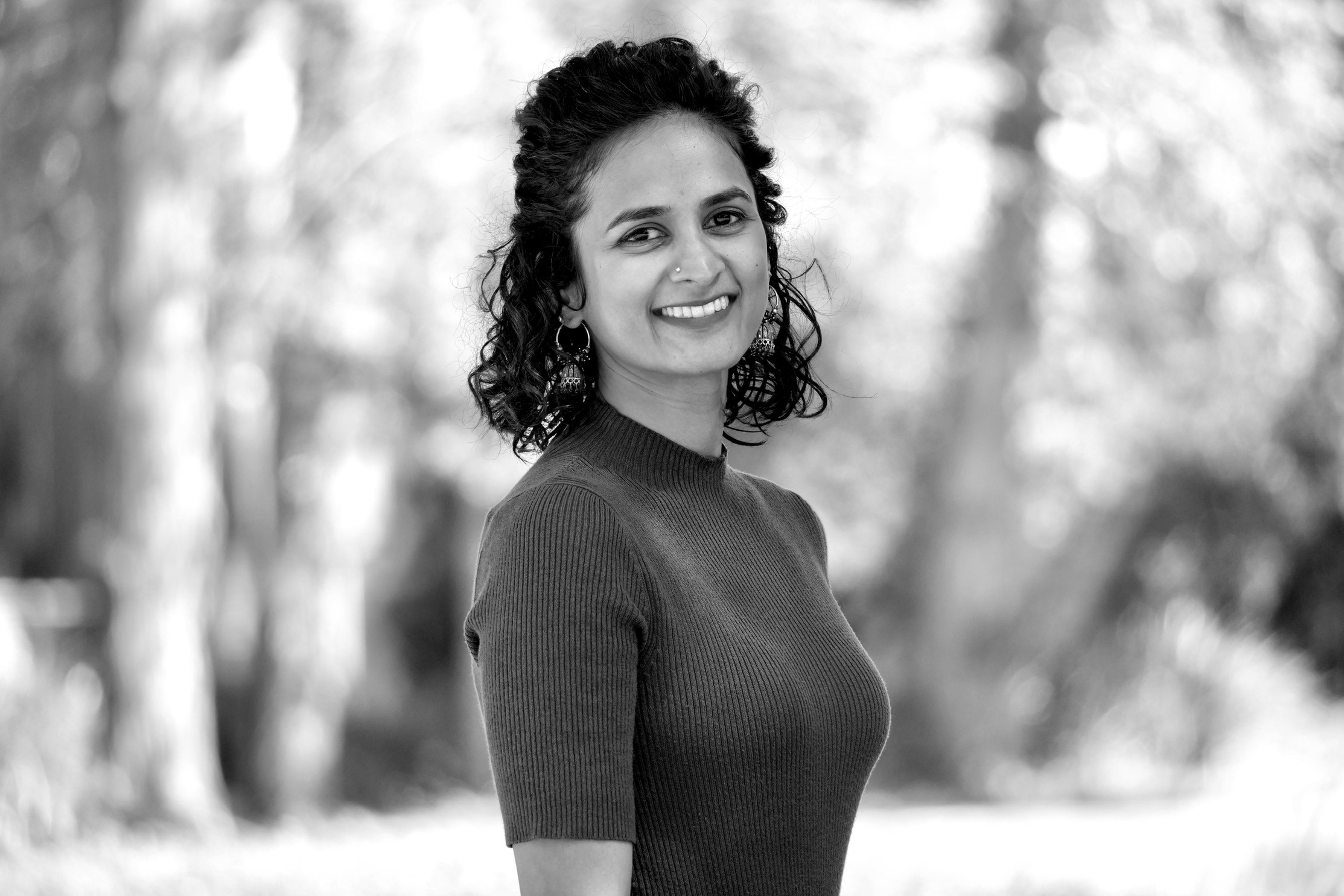
Dr. Pallavi Laxmikanth
Medical Anthropologist
Cybernetician
Food Systems Scholar
Over the past decade, I have built a diverse career across academia, the app-based food industry, and digital agencies, contributing as an anthropological researcher, UX and product designer, business strategist, and geneticist. Currently a postdoctoral fellow at the Australian National University’s School of Cybernetics, my research explores the intersection of human-like algorithmic agents, contemporary dance, and health technologies.
I hold a PhD in medical anthropology from the University of Adelaide (2023), where my dissertation, Embodied Measuring, examined how middle-class Indians use food, technology, and embodied practices to manage type 2 diabetes. My work is driven by a deep interest in how measurement systems and automated technologies shape our lives, particularly in navigating chronic illnesses. Recently, I was honored as a 2023-2024 Racial Justice Fellow by the Association for the Study of Food and Society (ASFS), for my research on the racialized dietary restrictions around mangoes and type 2 diabetes in India.
Select Works
The Taste of Homemade: Trusting ‘Healthy’ Food in App-Based Delivery Services in Hyderabad, 2024
This article explores how IT-employed households with type 2 diabetes in Hyderabad, India, determine trustworthy online food through ‘embodied knowing,’ a visceral sense of the food’s quality and the intentions of its maker. It highlights how apps leverage class, gender, and relational trust by evoking motherly figures to market home-style food as ‘safe’ and ‘healthy,’ thereby blurring the boundary between home and outside food.
Peer-reviewed article in Journal of Cultural Economy, part of a Special Issue on ‘Digital Eating’ edited by Jeremy Brice, Tanja Schneider and Karin Eli
Outwitting the Temporalities of ‘Control’ for Type 2 Diabetes in Urban India, 2022
Podcast by the Unit for Biocultural Variation and Obesity at the University of Oxford
This episode examines how urban Indians with type 2 diabetes, disillusioned by the biomedical framing of the condition as a lifelong illness requiring constant management, engage in practices of reversal. These practices, which focus on bodily attunement through medication reduction, dietary changes, and herbal supplements, promise an end to diabetes by subverting biomedical time regimes. By re-imagining time and health as a process of self-improvement, reversal redefines diabetes management from endless control to a more holistic approach centered on the body's own rhythms.
Policing Pleasure: Colonialism and Reversing Diabetes in Hyderabad, 2023
Podcast by Nutrire CoLab, a collective of feminist scholars of food and metabolic health.
Prof Megan Warin interviews Pallavi Laxmikanth about her dissertation research on diabetes and nutritional colonialism in Hyderabad. Pallavi explores how people with type 2 diabetes outwit biomedical and dietary forms of governance to reverse their illness. Using a phenomenological and STS inspired lens, she examines the colonial origins of biochemical and dietary measurements, and the sensual and affective dimensions of their presence in modern nutritional agendas. She demonstrates how measuring comes to be embodied by people with diabetes, as a means to contend with colonial and capitalist forms of indexing foods and bodies. Her interest in the intersection between food and health, is inspired by her previous work experience in the food industry in India.
Baking My Way Through Ethnography: Cakey Encounters With Diabetes During a Pandemic, 2021
Short Form Piece published in Open-Access Blog, Ethnographic Marginalia, edited by Sneha Annavarapu and Alexa
This article creatively explores how the act of baking cakes for research participants evolved into a meaningful tool for understanding how people with diabetes relate to taste, sweetness, and pleasure post-diagnosis. Initially intended as a gesture of thanks, the cakes became a medium for shared experiences, deepening connections and transforming into a collective project that redefined the participants' relationship with diabetes.
Embodied Measuring, 2025
The Dangers of Taste: Mango Pleasures and the Outwitting of Colonial Disgust, 2021
Paper presentation at the Australian Anthropological Society’s annual conference, held online due to COVID-19.
This presentation argues that colonial-era performances of ‘disgust’ toward culturally significant foods like mangoes have influenced modern dietary protocols, particularly for people with diabetes, who are warned against eating them due to their sweetness. Tracing the mango’s rich history and symbolic importance in India, the presentation suggests that colonial attitudes have been rationalized into nutritional science, perpetuating racialized control over dietary choices and framing ‘taste,’ especially sweetness, as a site of political and biomedical regulation.
Through my mother's case study, I describe how people with type 2 diabetes in middle-class South India, playfully yet strategically outwit the objective and 'controlling' biomedical ways of measuring BSLs, calories and nutrients. They did this through cultivating a taste and sensibility to the felt experience of blood sugar levels (and other biochemical indices) in the body and employed this awareness to commensurate foods, medicines, everyday experiences, and life events as compatible (or not) with their bodies and diabetes. I call this 'embodied measuring'. I emphasize the interplay of objective measuring and subjective sensing in a body that becomes with numbers and measuring devices, and underscore the significance of embodied measuring in living well with diabetes
Chapter in the Edited Volume Titled ‘Savouring Care: Flourishing with Diabetes Across Cultures’ edited by Emily Mendenhall and Jessica Hardin
My work at the School of Cybernetics encompasses the sensory and affective dimensions of the relationships shared among people and robotic, algorithmic, socio-technical systems.
Recognition
•
Recognition •









